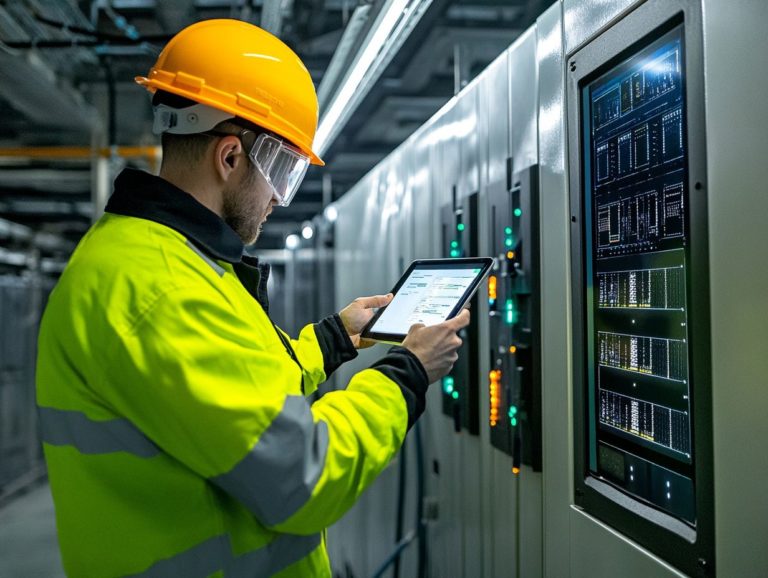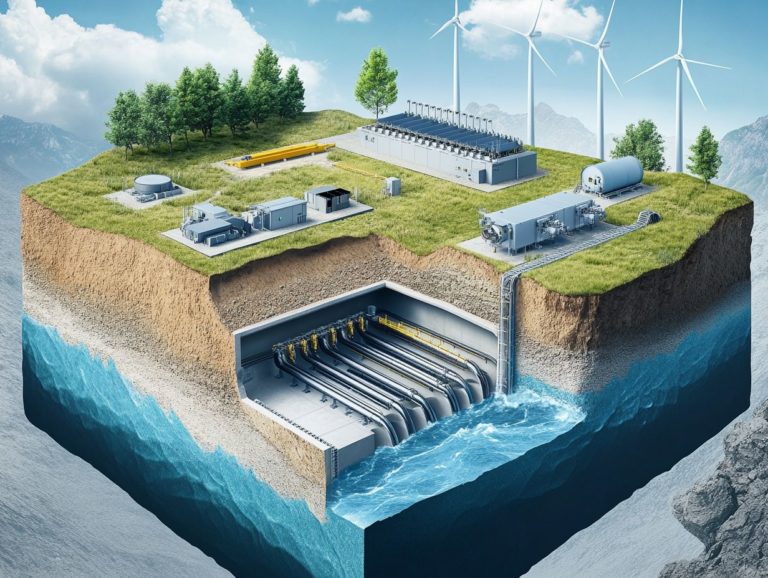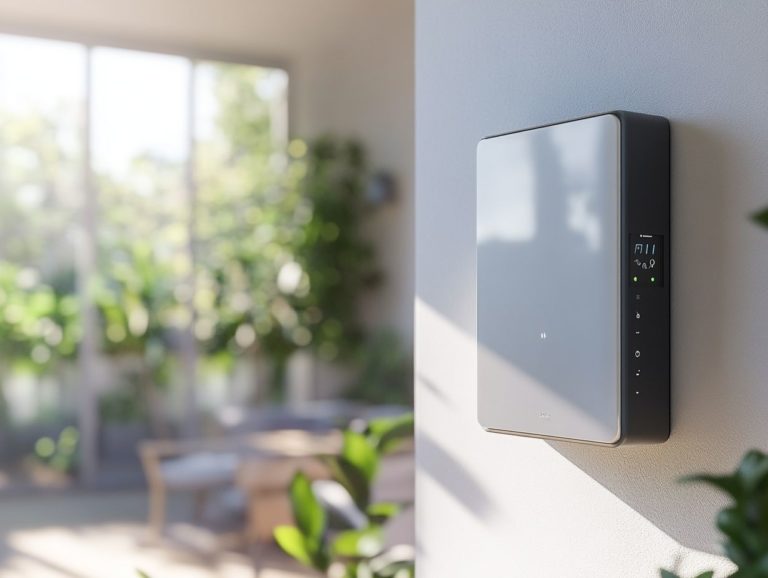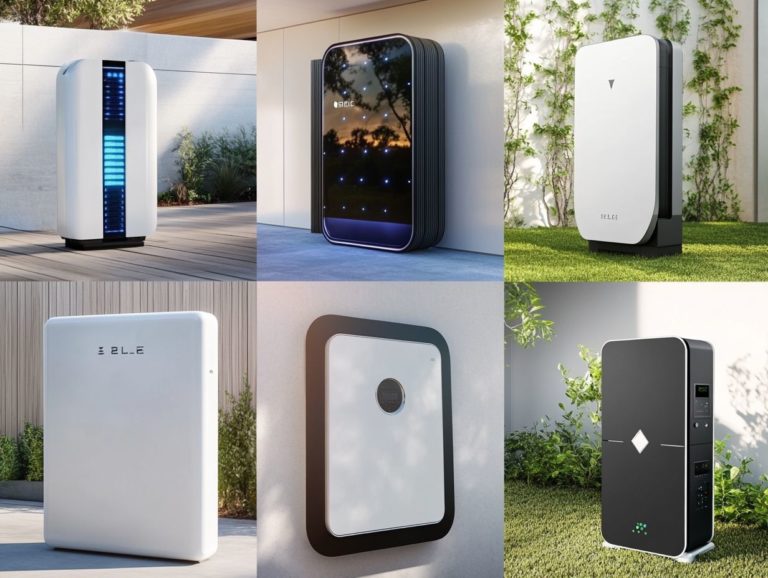How Energy Storage Can Facilitate EV Charging
As electric vehicles (EVs) gain momentum, the significance of energy storage in their charging infrastructure becomes more apparent.
Effective energy storage solutions enhance convenience and efficiency for EV owners while helping to reduce environmental impact. This article delves into the various types of energy storage systems, explaining how they operate, the challenges they encounter, and their potential to revolutionize the EV charging landscape.
Don t miss out on the incredible future of energy storage join the movement now and uncover its vital role in making electric mobility more accessible and sustainable for everyone.
Contents
- Key Takeaways:
- The Importance of Energy Storage for EV Charging
- Types of Energy Storage for EV Charging
- How Energy Storage Works for EV Charging
- Challenges and Solutions for Energy Storage in EV Charging
- Get Ready! The Future of Energy Storage in EV Charging
- Frequently Asked Questions
- What is the role of energy storage in helping EV charging?
- How does energy storage manage peak demand for EV charging?
- What are the benefits of using energy storage for EV charging?
- Can energy storage work with all types of EV charging stations?
- How do energy storage systems improve the reliability of EV charging?
- What is the future outlook for energy storage technologies in EV charging?
Key Takeaways:
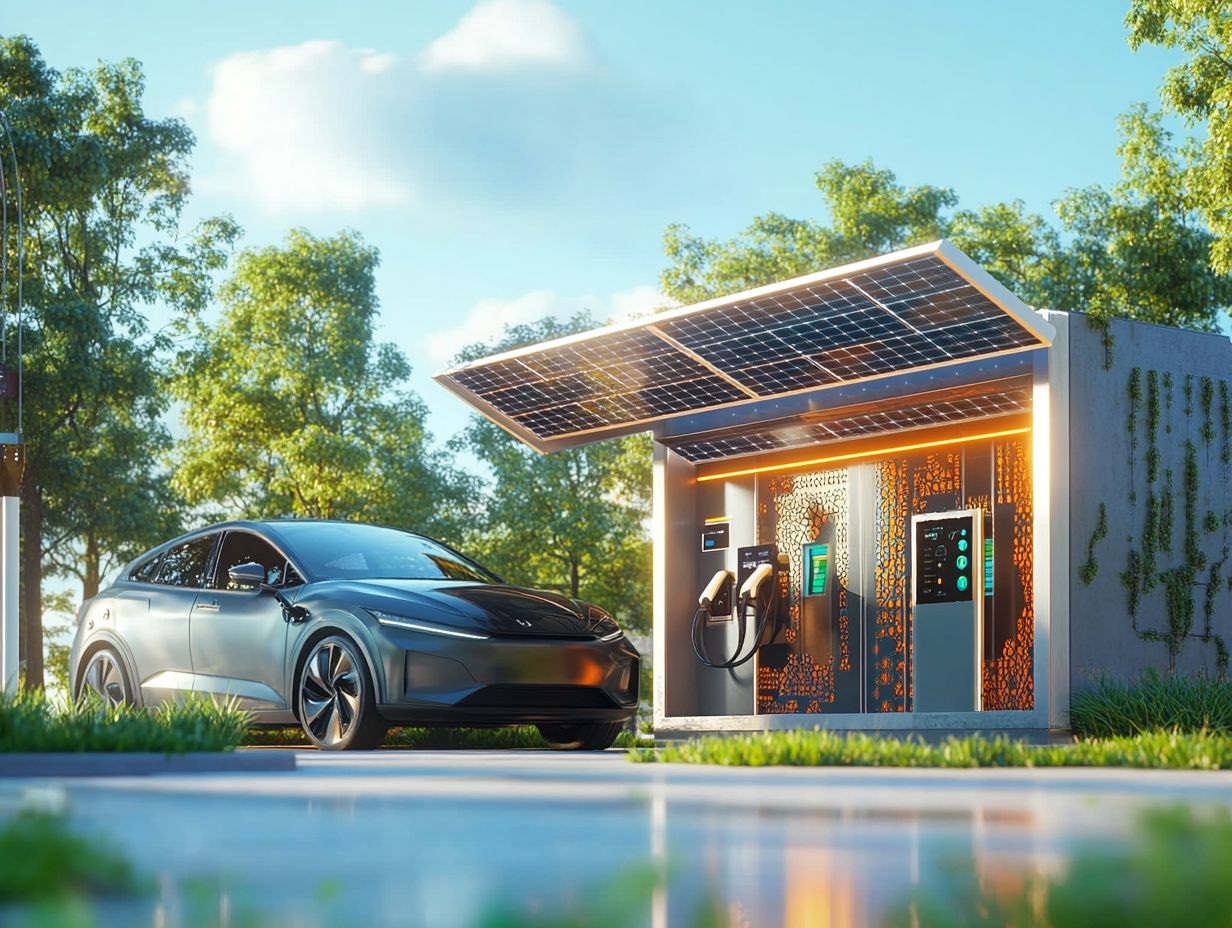
- Energy storage plays a crucial role in facilitating EV charging, providing benefits for both EV owners and the environment.
- Different types of energy storage, including lithium-ion batteries and capacitors, can be used for EV charging.
- Understanding how energy storage works, including various charging methods and technologies, is essential for optimizing EV charging.
The Importance of Energy Storage for EV Charging
Energy storage systems are crucial for elevating the efficiency and effectiveness of EV charging, especially as the demand for electric vehicles soars in our pursuit of sustainability.
Integrating battery energy storage with renewable sources like solar significantly reduces carbon footprints, mitigates demand charges, and optimizes electricity usage from the grid.
These energy assets can easily connect within microgrids, small local energy systems that can operate independently, and virtual power plants, offering essential load management and peak shaving capabilities. Understanding the science behind energy storage technologies revolutionizes your EV charging experience, paving the way for a smarter, more sustainable future.
Benefits for EV Owners and the Environment
The integration of energy storage solutions in electric vehicle (EV) charging not only benefits the environment by reducing carbon footprints but also provides substantial advantages in terms of cost savings and efficiency.
By harnessing renewable energy sources like solar and wind, you can significantly lower your energy costs, making sustainable transportation much more financially appealing. With energy storage systems, you have the flexibility to charge your vehicle during off-peak hours when electricity rates are lower, allowing you to optimize your expenses.
Beyond these individual savings, the environment benefits from your decreased reliance on fossil fuels, leading to cleaner air and reduced greenhouse gas emissions essential contributions in the fight against climate change. Ultimately, embracing advancements in energy technology not only paves the way for a greener future but also enhances your experience as an electric vehicle enthusiast.
Types of Energy Storage for EV Charging
Various energy storage technologies are essential for the efficient charging of electric vehicles (EVs). From cutting-edge battery energy storage solutions to capacitors and solar photovoltaic systems, the options available are both diverse and impactful.
Batteries, Capacitors, and More
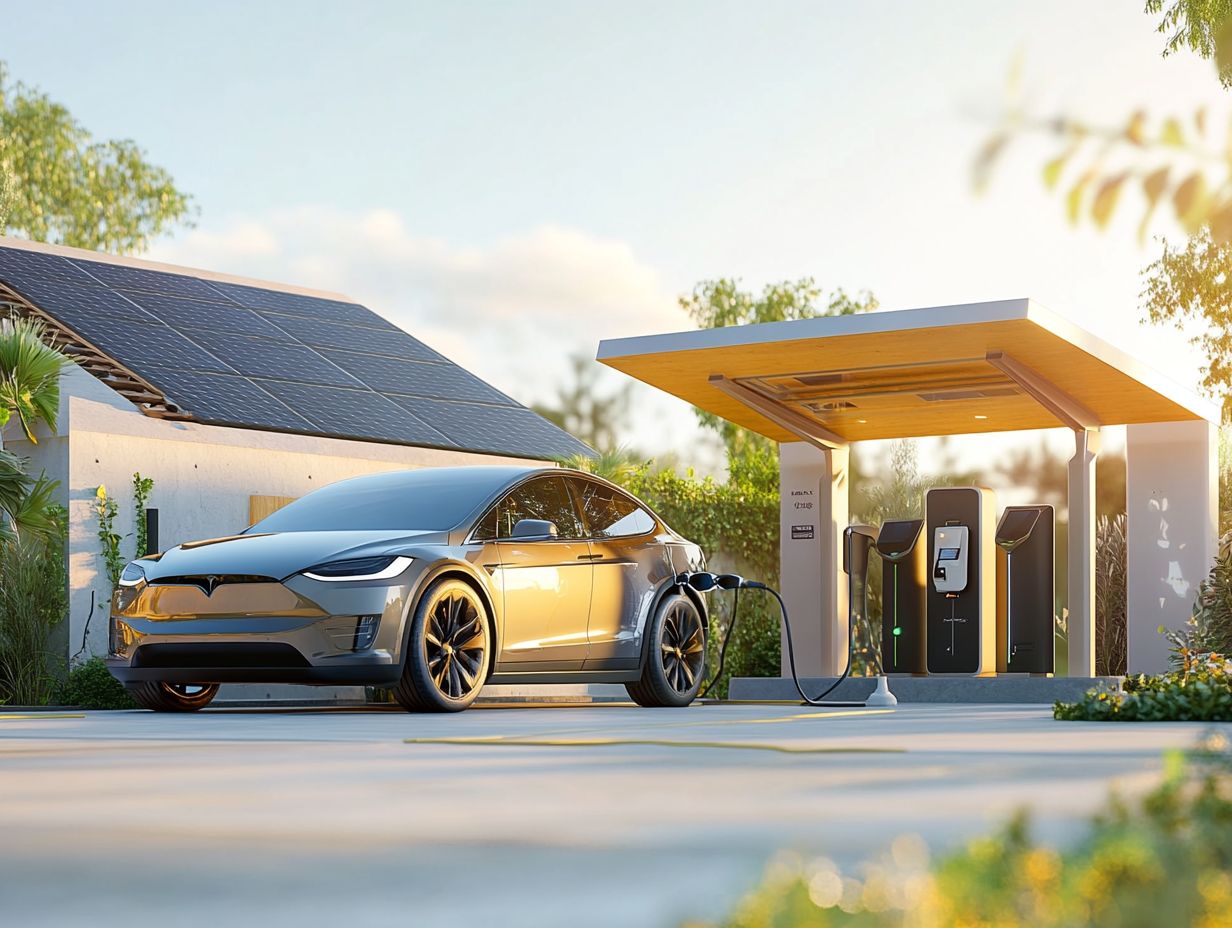
In the world of EV charging, battery storage systems, particularly lithium-ion batteries and capacitors, are at the forefront of energy storage technologies, each offering distinct advantages and applications.
These systems capture electrical energy and unleash it when necessary, playing a crucial role in boosting the efficiency and sustainability of electric vehicle operations. Lithium-ion batteries shine with their impressive energy density and longevity, making them perfect for extended use in vehicles. Conversely, capacitors, known for their rapid discharge capabilities, excel at delivering quick bursts of energy during high-demand moments.
By thoughtfully integrating these technologies, you can optimize charging speeds and energy management. The harmonious relationship between batteries and capacitors not only ensures a seamless charging experience but also enhances the overall lifespan and performance of electric vehicles, paving the way for a greener future, as energy storage supports grid stability.
In conclusion, embracing energy storage technologies is crucial for both EV owners and the environment, contributing to a sustainable future.
How Energy Storage Works for EV Charging
Energy storage systems elevate electric vehicle (EV) charging by employing a range of advanced charging methods and technologies. These innovations facilitate efficient energy transfer, ensuring that your vehicle receives the power it requires precisely when it needs it, optimizing both performance and convenience.
Charging Methods and Technologies
Various charging methods and technologies, such as DC fast chargers a type of charger that quickly powers your vehicle and new energy storage systems, play a crucial role in enhancing your electric vehicle charging experience.
As electric vehicle demand continues to soar, grasping these diverse charging options becomes increasingly essential for you. Take DC fast chargers, for example; they are engineered to dramatically cut down charging time, delivering impressive power output that can revive your vehicle’s battery in less than an hour, thus optimizing energy consumption. Additionally, understanding the environmental benefits of energy storage can further enhance your energy efficiency efforts.
The integration of energy storage systems takes these technologies to the next level. They enable excess energy to be stored for future use, which helps optimize grid stability and availability. This harmonious relationship between fast-charging infrastructure and energy storage for solar homes fosters a more sustainable energy ecosystem and offers you the convenience and flexibility you desire as an EV owner.
Challenges and Solutions for Energy Storage in EV Charging
While the advantages of energy storage for electric vehicle (EV) charging are undeniable, challenges like range anxiety and infrastructure limitations still linger. It s essential to explore new solutions to navigate these obstacles effectively.
Addressing Range Anxiety and Infrastructure Limitations
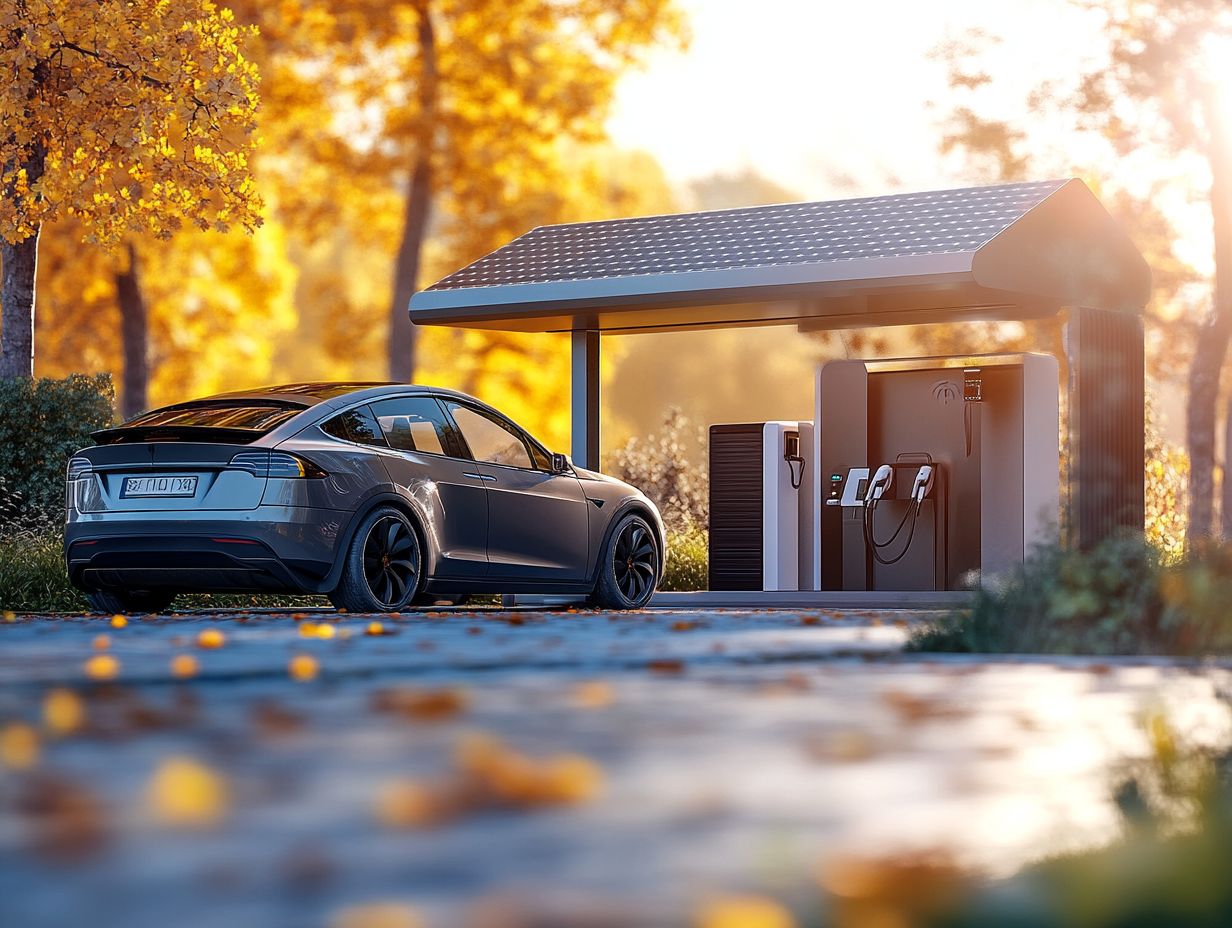
Range anxiety is a significant concern for electric vehicle (EV) owners, but new solutions are emerging to help you overcome these worries. By establishing a robust network of charging stations and integrating smart energy management systems, the industry is poised to enhance your confidence as a driver.
These advancements guarantee reliable access to charging options and optimize energy distribution, making it far easier for you to plan longer trips with confidence, especially when you consider energy storage for electric vehicles to alleviate the nagging fear of running out of power.
As automation and real-time data analytics progress, expect to benefit from dynamic routing and efficient charging schedules that minimize downtime. Ultimately, these developments pave the way for a future where the barriers to EV adoption fade away, encouraging deeper acceptance of sustainable transportation solutions. Additionally, understanding the impact of energy storage on home sustainability can further enhance this transition.
Get Ready! The Future of Energy Storage in EV Charging
The future of energy storage in electric vehicle (EV) charging is about to get exciting with groundbreaking innovations. This evolution promises to enhance sustainability and seamlessly integrate e-mobility solutions into your daily life.
Exciting Innovations in Energy Storage
Innovations in energy storage technologies are transforming the electric vehicle (EV) charging landscape. Advancements in battery energy storage and other solutions pave the way for a more sustainable future.
You’re witnessing the rapid evolution of battery chemistries, particularly with solid-state batteries leading the charge. These advancements promise greater energy density and enhanced safety compared to traditional lithium-ion models.
Fast-charging infrastructure is also making strides, significantly cutting down the time it takes to recharge, which effectively alleviates range anxiety for drivers like you.
Moreover, integrating renewable energy sources like solar and wind into charging stations amplifies the sustainability factor, enabling you to power your vehicle with clean energy.
These innovations enhance efficiency and help lower your overall carbon footprint, making electric vehicles a compelling choice for eco-conscious consumers.
Frequently Asked Questions
In this section, we will address some common queries regarding energy storage and EV charging to help you better understand this evolving technology.
What is the role of energy storage in helping EV charging?
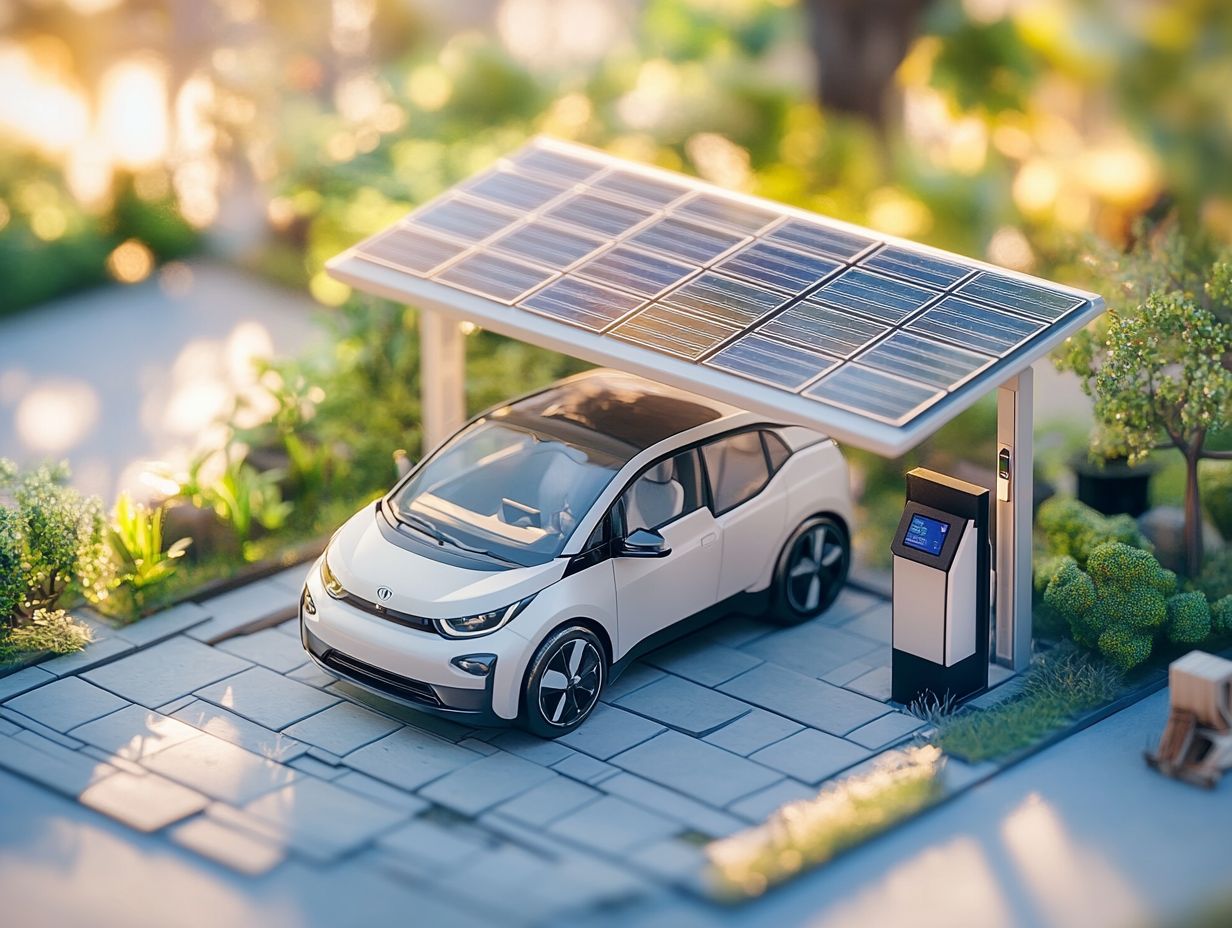
Energy storage is key for reliable EV charging. It provides an efficient electricity source for charging stations.
How does energy storage manage peak demand for EV charging?
Energy storage stores excess energy during off-peak hours. It releases this energy during peak times, ensuring a steady and cost-effective electricity supply for EV charging.
What are the benefits of using energy storage for EV charging?
Energy storage reduces the strain on the grid. It also lowers electricity costs and increases the efficiency of charging stations.
Can energy storage work with all types of EV charging stations?
Absolutely! Energy storage integrates seamlessly with fast charging, level 2 charging, and even wireless charging systems.
How do energy storage systems improve the reliability of EV charging?
Energy storage acts as a backup electricity source. This helps EV charging stations stay operational during power outages or grid fluctuations.
What is the future outlook for energy storage technologies in EV charging?
The future looks bright! As more electric vehicles hit the road, energy storage systems will become more affordable and efficient, fueling the growth of EV charging.



